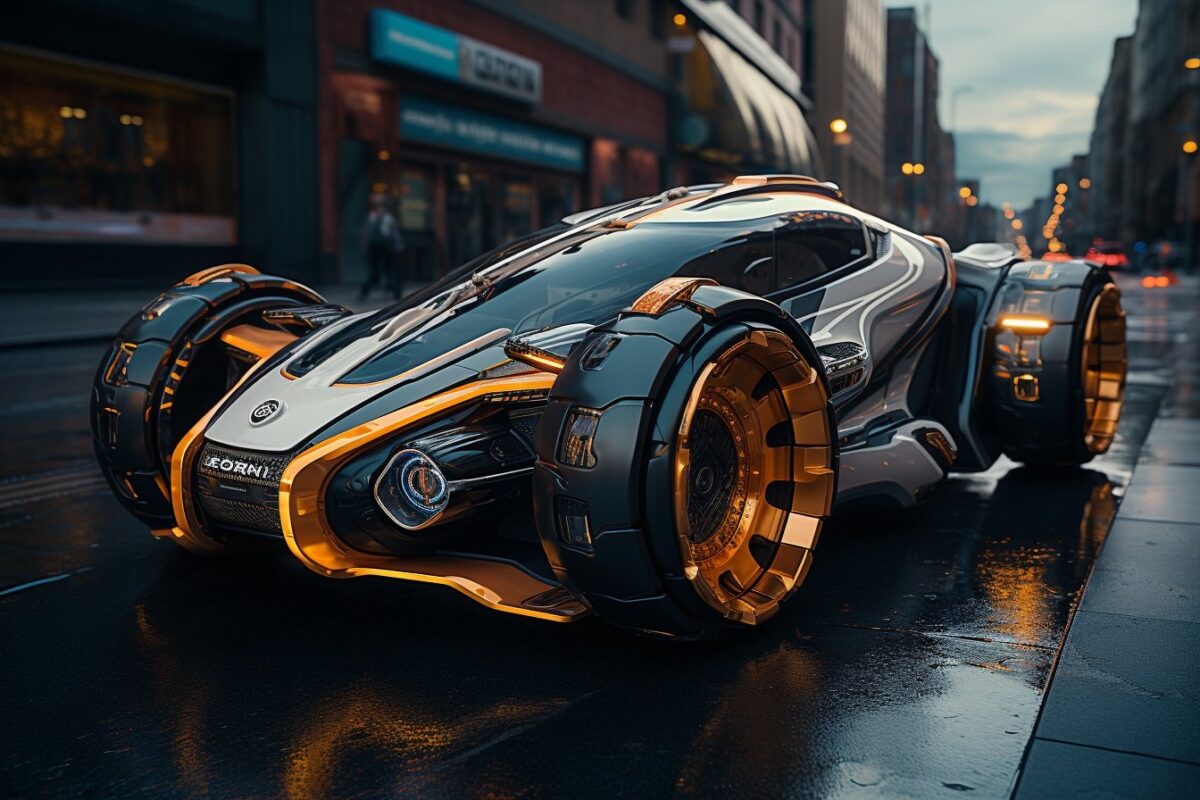In a world where the most complex task most of us undertake before our first cup of coffee involves navigating the treacherous terrain of the morning bathroom routine, it’s both comforting and slightly alarming to consider that, out there, artificial intelligences are already deciding the stock market’s fate before breakfast. But even as we grapple with the notion that our jobs might be on the line – a thought as unsettling as discovering you’re out of coffee on a Monday morning – there’s an even more pressing concern that lurks in the urban jungle: the quest for a parking spot.
Picture this: you, a mere human, armed with nothing but hope and a rapidly cooling latte, circling the block like a vulture with a lease, seeking that elusive stretch of curb. Now, imagine a future where your car, driven by an AI with the unerring efficiency of a homing pigeon and possibly less empathy, finds that spot for you. No more circling, no more muttered curses as someone swoops into ‘your’ spot – just the quiet hum of electric motors and the smug satisfaction of technology triumphing over the mundane.

This future, where AI not only takes our jobs but also our age-old battle against the perils of parallel parking, is upon us. And as we stand on the cusp of this brave new world, where our biggest worry might just be what to do with all that extra time not spent looking for parking, one can’t help but wonder: is the era of human parking prowess, much like the era of human map-reading, destined to be a quaint relic of the past? Only time, and perhaps our AI chauffeurs, will tell.
II. The Rise of AI in the Workplace
Gone are the days when “artificial intelligence” was a term used exclusively in science fiction and the dusty corners of tech enthusiasts’ forums. Now, AI has sauntered into our workplaces with the quiet confidence of a cat that knows it’s about to steal your favorite chair.
Take, for instance, the realm of customer service. AI chatbots, with names that sound like they were picked during a nostalgic trip through a 1950s baby name book, have begun answering questions with relentless cheer. These digital helpers are perpetually at the ready, lacking any need for coffee breaks or gossip about the latest office drama.
Moving over to the literary side of things, AI programs are now drafting everything from sports updates to financial reports. They churn out text with a mechanical efficiency that would make a seasoned journalist’s typewriter blush. Yet, one wonders, do these AI scribes ever dream of penning a great novel, or perhaps starting an AI-written poetry blog?
And who could overlook the ever-present self-checkout machines? These are the unsung heroes (or villains, depending on your perspective and barcode-scanning skills) of the supermarket world. They calmly guide us through the checkout process with a patience that borders on saintly, even as they passive-aggressively remind us about the unexpected item in the bagging area.
When asking human employees about their new AI coworkers, the responses are tinged with a humor that only comes from the absurdity of it all. “It’s nice not having to make small talk with the photocopier anymore,” one worker muses, a twinkle in their eye that suggests they might not miss the old ‘paper jam at 3 pm’ routine.
As we march forward in this age of AI colleagues and robot assistants, we’re learning new ways to coexist. Sure, they may not appreciate the art of a well-timed coffee break, but on the plus side, they’ve never once microwaved fish in the break room. It’s a brave new world, indeed – one where your lunch remains your own, and office small talk is, thankfully, optional.
II. The Rise of AI in the Workplace
Gone are the days when “artificial intelligence” was a term used exclusively in science fiction and the dusty corners of tech enthusiasts’ forums. Now, AI has sauntered into our workplaces with the quiet confidence of a cat that knows it’s about to steal your favorite chair.
Take, for instance, the realm of customer service. AI chatbots, with names that sound like they were picked during a nostalgic trip through a 1950s baby name book, have begun answering questions with relentless cheer. These digital helpers are perpetually at the ready, lacking any need for coffee breaks or gossip about the latest office drama.
Moving over to the literary side of things, AI programs are now drafting everything from sports updates to financial reports. They churn out text with a mechanical efficiency that would make a seasoned journalist’s typewriter blush. Yet, one wonders, do these AI scribes ever dream of penning a great novel, or perhaps starting an AI-written poetry blog?

And who could overlook the ever-present self-checkout machines? These are the unsung heroes (or villains, depending on your perspective and barcode-scanning skills) of the supermarket world. They calmly guide us through the checkout process with a patience that borders on saintly, even as they passive-aggressively remind us about the unexpected item in the bagging area.
When asking human employees about their new AI coworkers, the responses are tinged with a humor that only comes from the absurdity of it all. “It’s nice not having to make small talk with the photocopier anymore,” one worker muses, a twinkle in their eye that suggests they might not miss the old ‘paper jam at 3 pm’ routine.
As we march forward in this age of AI colleagues and robot assistants, we’re learning new ways to coexist. Sure, they may not appreciate the art of a well-timed coffee break, but on the plus side, they’ve never once microwaved fish in the break room. It’s a brave new world, indeed – one where your lunch remains your own, and office small talk is, thankfully, optional.
III. AI’s Expanding Role in Daily Life
As we venture further into this AI-augmented era, it’s becoming increasingly clear that these digital maestros aren’t content with just revolutionizing the workplace. They’re elbowing their way into our daily lives with the subtle finesse of a bulldozer in a china shop.
Imagine, if you will, a world where your personal assistant isn’t a person at all. Instead, it’s a chirpy AI named something endearingly human, like ‘Bob’ or ‘Sally’. It reminds you of your mother’s birthday, the name of your first-grade teacher, and the fact that you’re almost out of toothpaste – all with the calm assurance of someone who has never experienced the panic of a last-minute gift purchase.
Then there’s the realm of home automation. Lights that turn on as you enter a room, thermostats that adjust to your whims before you even know you have them, and fridges that send you passive-aggressive notes about your expired milk. It’s like living in a fairy tale, if the fairy tale was written by a team of overeager software developers.

And let’s not forget the world of entertainment. AI is now curating our music, our movies, and even our newsfeeds. It’s like having a DJ, a film critic, and a nosy neighbor all rolled into one – except this one doesn’t borrow your lawn mower.
In conversations with everyday people about their AI interactions, the reactions range from awe to bemusement. “I asked my smart speaker for a weather update and got a recipe for banana bread. I mean, it was a good recipe, but still,” shares one bemused homeowner. It seems even in its quest to be helpful, AI can still miss the mark – but at least it’s endearing when it does.
As we wrap our heads around this new reality where AI is more than just a work tool, but a constant companion, we find ourselves in an odd dance of adaptation and surprise. It’s a world where forgetting to say ‘please’ and ‘thank you’ to your AI assistant feels almost rude, and where you might just get that banana bread recipe you never knew you needed.
IV. Autonomous Vehicles: A Parking Revolution
Now, let’s steer our attention to one of AI’s most daring ventures yet: autonomous vehicles. This isn’t just about cars that drive themselves; it’s about revolutionizing the time-honored tradition of circling the block for a parking spot.
Picture this: a world where your car not only drives you to your destination but also tactfully drops you off and goes to park itself. It’s like having a valet who doesn’t expect a tip and won’t judge your car’s cluttered interior. The streets are no longer lined with the idle, exhaust-spewing predators of parking spaces. Instead, they quietly whisk themselves away, leaving the curbside free for joggers, dog walkers, and the occasional street artist.
In this not-so-distant future, the ritual of parking transforms from a grueling test of wills and parallel parking skills into a seamless, almost magical experience. No more battling for supremacy over a patch of asphalt. No more glowering at the driver who sniped your spot. Just a serene, dignified arrival and an AI chauffeur handling the rest.

The public’s reaction to this new era of parking is a mix of relief and nostalgia. “I used to judge my self-worth by my ability to squeeze into tight parking spots,” confesses one driver, now slightly wistful. “Now what am I going to brag about at parties?”
As these AI-driven cars glide through our streets, they bring with them a quiet revolution. A world where the phrase “Sorry, I’m late – couldn’t find parking” becomes a quaint reminder of a bygone era, much like “Sorry, I’m late – had to wind up my watch” is today.
In embracing this autonomous revolution, we’re not just freeing ourselves from the shackles of parking. We’re entering a new age of convenience, efficiency, and perhaps, a touch of laziness. But then again, who among us hasn’t dreamt of a world where finding a parking spot is as outdated as using a rotary phone?
V. The Unexpected Perks of AI Dominance
In the AI-tinted landscape of our lives, some perks are as unexpected as finding a forgotten $20 bill in your winter coat. First, consider the newfound abundance of free time. With AI scheduling your meetings and managing your reminders, you could take up hobbies you never dreamed of – like synchronized skydiving or knitting tiny hats for cats.
Then there’s the charming spectacle of AI misinterpreting your requests. Picture asking your smart device to play some jazz, and instead, it gives you a passionate lecture on the history of jazzercise. It’s these moments of quirky confusion that add a dash of spice to our otherwise predictable days.
Let’s not forget the small domestic triumphs. AI in our homes means potentially saying goodbye to life’s little annoyances. Like when your smart vacuum becomes a pet hair-seeking missile, relentlessly patrolling your floors with the determination of a cat chasing a laser pointer.

And for those who’ve always dreamed of having a personal assistant, AI now offers a taste of that lifestyle. Granted, it’s an assistant who occasionally mistakes your grocery list for a set of cryptic riddles, but it’s the thought that counts.
Interviews with people basking in the glow of AI’s perks reveal a blend of intrigue and mild bewilderment. “My smart oven preheats itself for pizza every Friday night,” one proud owner shares. “It’s either incredibly thoughtful or it’s making a judgment call on my diet. I haven’t decided which.”
As we waltz through this AI-assisted existence, we’re finding that our digital companions bring a mix of efficiency and unexpected hilarity. In this world, it’s not just about the convenience of having an AI sidekick; it’s about the odd, often amusing, ways they interpret our human world. It seems that in trying to streamline our lives, AI has also unwittingly signed up to be the comic relief.
VI. Conclusion: Embracing the AI Takeover with a Smile
So, as we tie up our exploration of the AI uprising, the undeniable truth stands: our jobs, our parking woes, and a slice of our everyday lives are being whisked away by algorithms and code. But rather than a dystopian dirge, this could be more of a celebratory jig.
In this brave new world where AI takes the wheel, both metaphorically and in our self-driving cars, there’s a peculiar sense of relief. It’s akin to realizing that the robot vacuum cleaner won’t judge you for eating cookies in bed – it just dutifully cleans up the crumbs.
Imagine strolling into work (or logging in from your living room) knowing that the monotonous parts of your job are now in the capable, non-existent hands of AI. It’s like having a tireless, efficient sidekick who doesn’t mind doing the grunt work. This leaves you free to ponder the bigger questions, like whether you should start a podcast about your passion for rare tropical fish.
And let’s not forget the sheer joy of AI mastering the art of parking. It’s not just about saving time; it’s about the end of parking-related rivalries. No more circling blocks, no more duels for that one spot that’s just a tad too small. Just a graceful, automated ballet of cars slotting themselves neatly away.
In the end, as we watch AI step into roles and tasks we once guarded as solely human, there’s an odd comfort in it. It’s not about losing our place; it’s about gaining a multitude of new possibilities. Sure, we might get nostalgic for the old ways, much like we fondly remember the sound of dial-up internet, but the future beckons with the promise of something different – and possibly, even better.

